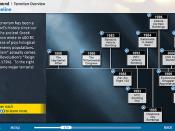Terrorism can be defined in many ways. In the context of this essay, terrorism is defined as the calculated use of violence or the threat of violence to evoke extreme fear in the community or to intimidate governments in the pursuit of political goals.
POST-MODERN TERRORISM
With the decline of communism, terrorist groups, which promoted leftist ideologies, have increasingly been isolated and lacking popular support. Left wing and anarchist violence has been declining, while religious and right wing violence has been increasing. There has also been an increase in terrorism related to nationalist and ethnic separatist struggles. Ethnic terrorists have more staying power than ideologically motivated ones, since they draw on a larger reservoir of public support.
Of the 35 or so terrorist groups active today, more than half are religiously motivated. The increasing use of violence by Islamic extremist groups is a particular concern. Islamic groups now account for most of the deaths from terrorism.
Charismatic religious extremist sects, like the branch Davidians and Aum Shinrikyo, have also become a cause of concern.
Right wing elements have become an increasing problem in Western society, sometimes linked with neo-Nazi ideology. The focus of their attention is usually immigrants, racial minorities, and threats to what they see as their legitimate way of life - often involving the right to bear arms and stockpile weapons. A potential problem area for the future is the single-issue groups, which may have violent extremists elements. Such issues include right to life, environmental protection and animal rights.
1968 marked the beginning of modern international terrorism, when the popular front for the Liberation of Palestine hijacked an El Al Boeing 707 en route from Rome to Tel Aviv. This incident is widely regarded as a principal initiator of international terrorist attacks, which have exerted significant influence during...


